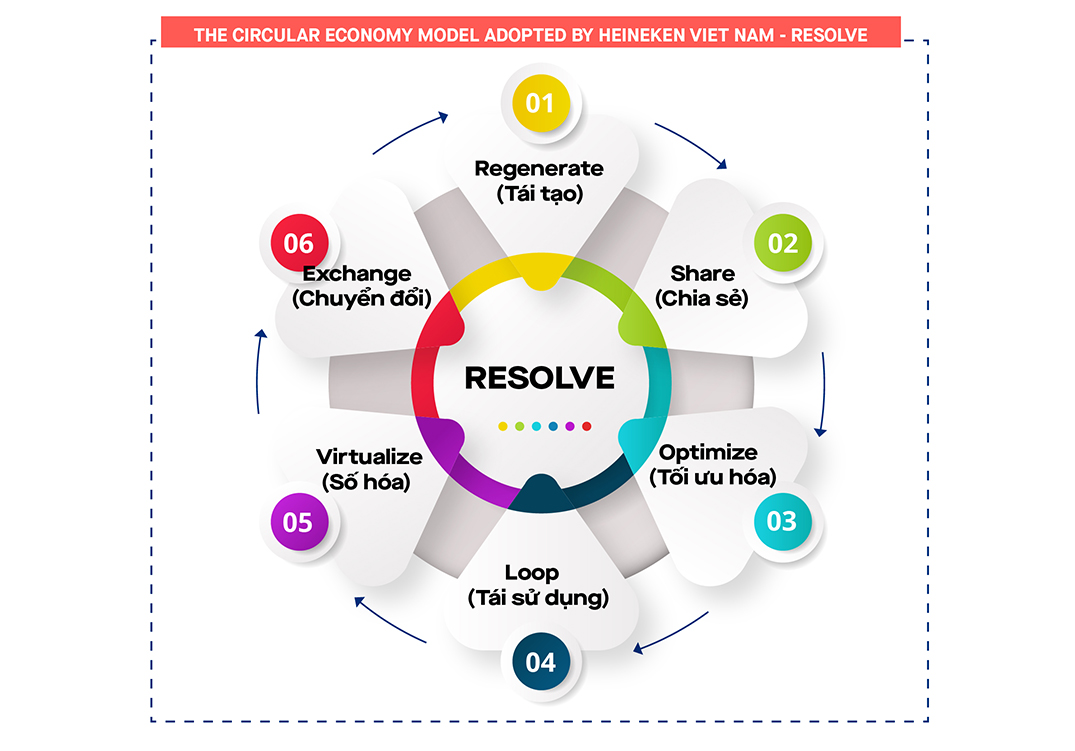Green Recovery to Promote Economy


Some extreme weather patterns, including strong tropical storms, saline intrusions and severe droughts, etc., have successively occurred in 2020 due to the climate change impacts, making people in many areas of Vietnam even more difficult when they have been already heavily affected by the Covid – 19 pandemic. The double impact of the pandemic and natural disasters over the past year has made green growth a must-have option and requires immediate action from related parties.

In the early days of December 2020, most Vietnamese must wear face masks. The cause is not only the fear of COVID-19, but also of polluted air. In the country’s major cities, the air is four times more polluted than the safety level recommended by international agencies. Vietnam remains vulnerable to many health and environmental disasters. “Beyond air pollution, which is killing an estimated 60,000 people every year, the country is exposed to coastal erosion, drought, and saline intrusion and landslide”, the latest report titled “From COVID-19 to Climate Change: How Vietnam can become the Champion of Green Recovery” of the World Bank (WB) opened like that when it said about the problems that Vietnam is facing.

The impact of natural disasters in the context of the economy, businesses and people facing difficulties caused by the Covid – 19 pandemic is a “further” blow, causing even more severe injuries.

Losses caused by natural disasters and environment show the fragility of human before disasters. It is comparative to what is happening when people confront the Covid–19 pandemic. With this crisis, compared to many countries, Vietnam is having certain successes. It is expected that Vietnam’s GDP will increase by nearly 3% in 2020. This is an uncommon positive growth in Asia within the context of Covid–19 devastating economies.
The problem is that, according to the report, Vietnam is standing at a crossroads of post-Covid-19 recovery and it is necessary to choose between the previous path or the green recovery path to help deal with the impacts of future epidemics, of disaster and climate risks, and building a more resilient future?

Ms. Carolyn Turk, World Bank Country Director for Vietnam stated that: “Vietnam must tackle the environmental and climate challenges with the same sense of urgency as they have done with Covid-19 because the costs of inaction are already visible and will become increasingly irreversible. The recent tropical storms in Vietnam’s central region and rising air pollution in the country’s major cities are good illustration of this fragility.”
According to the report, becoming a pioneer in green recovery will help Vietnam achieve several goals. In addition to the obvious environmental benefits associated with green recovery, policy and investment will also create more jobs, promote economic activities, and help restore fiscal space. This is also a smart decision as many of the multinational corporations that Vietnam wants to attract are increasingly interested in green policy, stemming from the company’s responsibility to their customers.
And the World Bank recommends that the experiences and lessons learned from the successful Covid–19 anti-epidemic can also be applied to Vietnam to solve environmental problems. Accordingly, green recovery should be Vietnam’s top priority and “talking the talk and walking the walk”. Only when this is determined, like coping with the Covid-19 pandemic, can the Government take decisive, timely actions and receive support from businesses and people.

Green growth is not only at the national level but also is a demand from consumers. The report on environment and sustainable development called “Who Cares Who Does” recently announced by Kantar Vietnam, a market research company, said that up to 44% of the survey participants expected FMCG manufacturers taking action to minimize negative impact on the environment. While this rate for retailers is only 3%.
Also according to the research, a lot of consumers (known as an interest group and whose spending account for nearly 40% of FMCG industry revenue for home consumption) are willing to abandon products or services that have a negative impact on the environment or community. These people are also particularly supportive of companies and businesses that really take action.

Green growth, sustainable development, before the recommendations of the World Bank to the Government of Vietnam, has been a strategy pursued by many businesses. As at HEINEKEN Vietnam, climate change is considered one of the serious threats to the livelihoods of many families and the Vietnamese economy, so efforts have been made by HEINEKEN to produce business in a sustainable manner through the maximum application of the circular economy model.

Accordingly, 5/6 HEINEKEN Vietnam factories have currently been brewing beer with 100% renewable energy. HEINEKEN Vietnam has optimized the load, they use Euro IV trucks and take advantage of using train transportation. This is an initiative to help reduce more than 2,000 tons of carbon emissions. Thanks to the re-use and recycling of up to 99 percent of waste or by-products in production, HEINEKEN Vietnam also has virtually no landfill waste left. Bottles and keg are recovered back to the factory after being sold to the market, then undergone a strict sterilization process to ensure hygienic standards for re-use.
![]()
At Unilever Vietnam, the strategy to halve the environmental impact in production and business activities has been realized with a number of specific actions. Unilever’s factories are committed to not discharging waste into the environment and 100% of the factory’s emissions are carbon positive. The company also utilizes 48% of renewable energy and reduces the amount of water in production by 43%.



Mr. Vo Minh Nhut, President of NS BlueScope Vietnam said that it is time for the leaders of business to pay more attention on establishing an objective for their business, rather than simply focusing on profits. It does not imply that profit is not important, but it must and should come from doing the right thing, responsibility and creating sustainable values for the community, the economy as well as the planet. Therefore, green growth is the responsibility that businesses need to conduct to join hands and contribute to the above objectives.
At BlueScope Steel and NS BlueScope Vietnam, climate change is one of the five main problems for the Board of Management and Directors to formulate sustainable development policies. BlueScope Steel Corporation has set a goal of reducing carbon emissions by 12% until 2030 and announced an investment of 20 million AUD in the development of new steel making technologies to eliminate CO2 emissions in 2050. In Vietnam, since 2013, BlueScope factory in Ba Ria – Vung Tau has also pursued a CO2 emission reduction plan with the goal of reducing more than 6 million kg of CO2 by 2023 through using clean energy, improving production process and applying advanced technology.



According to Mr. Nhut, the no less important factor in the green growth strategy is the close cooperation among many parties, between businesses, businesses and Government as well as Government and Government. Businesses are in desperate need of incentive and supportive policies from the State. In many cases, they will also be policy proponents from their practical implementation experience. In particular, the business pioneers need to stimulate and inspire smaller businesses to cooperate and act in this journey.
